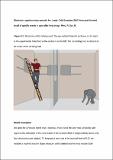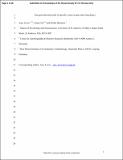Files in this item
Non-goal directed recall of specific events in apes after long delays
Item metadata
| dc.contributor.author | Lewis, Amy | |
| dc.contributor.author | Call, Josep | |
| dc.contributor.author | Bernsten, Dorthe | |
| dc.date.accessioned | 2018-07-11T23:34:21Z | |
| dc.date.available | 2018-07-11T23:34:21Z | |
| dc.date.issued | 2017-07-12 | |
| dc.identifier | 250199098 | |
| dc.identifier | fa384733-e6d9-418e-90ec-3b8c709e449d | |
| dc.identifier | 28701556 | |
| dc.identifier | 85023773979 | |
| dc.identifier | 000405958600010 | |
| dc.identifier.citation | Lewis , A , Call , J & Bernsten , D 2017 , ' Non-goal directed recall of specific events in apes after long delays ' , Proceedings of the Royal Society B: Biological Sciences , vol. 284 , no. 1858 . https://doi.org/10.1098/rspb.2017.0518 | en |
| dc.identifier.issn | 0962-8452 | |
| dc.identifier.other | ORCID: /0000-0002-8597-8336/work/37477806 | |
| dc.identifier.other | ORCID: /0000-0001-8616-2411/work/35609721 | |
| dc.identifier.uri | https://hdl.handle.net/10023/15266 | |
| dc.description | This research was funded by the Danish National Research Foundation (DNRF89). | en |
| dc.description.abstract | We examined if apes spontaneously remember one-time, distinctive events across long delays when probed by discriminant cues. Apes witnessed an experimenter hide a cache of food, which they could then retrieve. They retrieved one of two food types; one more distinctive than the other. Two, 10 or 50 weeks later, the apes returned to the same enclosure and found a piece of the previously hidden food on the ground. An experimenter who had not hidden the food was also present. Apes immediately searched the location where the food was previously hidden (no food was here), showing recall of the event. One week later, apes returned to the same enclosure, with the same food on the ground, but now the experimenter that had hidden the food was present. Again, apes immediately searched the hiding location. Apes that had not witnessed the hiding event did not search. There was no significant effect of food type, and retention declined from exposure to the two-week delay, then levelled, consistent with the forgetting curve in humans (Ebbinghaus, H. 1964 Memory: a contribution to experimental psychology (transl. H.A. Ruger & C.E. Bussenvis). New York, NY: Dover. (Original work published 1885.)). This is the first study to show apes can recall a one-time, non-goal-directed event longer than two weeks ago and that apes' recall declines in accordance with a standard retention function. | |
| dc.format.extent | 9 | |
| dc.format.extent | 379416 | |
| dc.format.extent | 136729 | |
| dc.language.iso | eng | |
| dc.relation.ispartof | Proceedings of the Royal Society B: Biological Sciences | en |
| dc.subject | Great apes | en |
| dc.subject | Episodic memory | en |
| dc.subject | Cued recall | en |
| dc.subject | Distinctiveness | en |
| dc.subject | Spontaneous memory | en |
| dc.subject | Forgetting curve | en |
| dc.subject | H Social Sciences | en |
| dc.subject | QH301 Biology | en |
| dc.subject | RC0321 Neuroscience. Biological psychiatry. Neuropsychiatry | en |
| dc.subject | BF Psychology | en |
| dc.subject | DAS | en |
| dc.subject.lcc | H | en |
| dc.subject.lcc | QH301 | en |
| dc.subject.lcc | RC0321 | en |
| dc.subject.lcc | BF | en |
| dc.title | Non-goal directed recall of specific events in apes after long delays | en |
| dc.type | Journal article | en |
| dc.contributor.institution | University of St Andrews. School of Psychology and Neuroscience | en |
| dc.contributor.institution | University of St Andrews. Centre for Social Learning & Cognitive Evolution | en |
| dc.identifier.doi | 10.1098/rspb.2017.0518 | |
| dc.description.status | Peer reviewed | en |
| dc.date.embargoedUntil | 2018-07-12 |
This item appears in the following Collection(s)
Items in the St Andrews Research Repository are protected by copyright, with all rights reserved, unless otherwise indicated.


